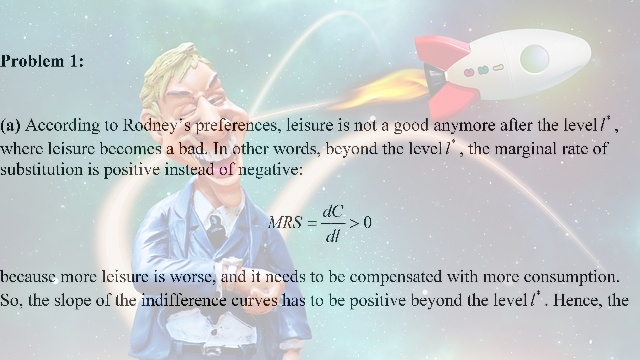[Solution] Problem 1: Rodney has a degree in economics. Being exceptionally - #80045
Problem 1: Rodney has a degree in economics. Being exceptionally studious, Rodney has learnt that all of his desires in life can be summarized by a utility function U(c, l), where c is his consumption of goods and l is his consumption of leisure. Rodney always enjoys consuming more of c. i However, since he was never taught how to have fun, he finds he only enjoys leisure up to some point l* (which is below the total amount of time at his disposal ). and any additional leisure actually reduces his utility.
a. Sketch Rodney's indifference curves. Explain their shape intuitively.
b. Show that Rodney will always consume less leisure than l*. Explain why.
c. Derek is an entrepreneur. He never got a degree in economics. Derek meets Rodney and decides to offer him a job with a wage of zero. Would Rodney ever accept such an offer? If so how many hours will Rodney work?
d. Derek gets tired of Rodney being around all the time and moves away. It takes t hours at a cost of m dollars for Rodney to go and continue working for Derek. Despite this. and much to Derek's chagrins Rodney continues to "work" for Derek. Why?
Problem 2:
In the UK, the government introduced a welfare program known as the Working Families' Tax Credit (WFTC) in 1999. The structure of the WFTC is as follows. If a
potential worker works less than 16 hours per week, she receives no WFTC. If she works between 16 and 26 hours, she receives 60 British pounds in WFTC. Thereafter, if she works more than 26 hours, for each additional dollar she earns, her WFTC payment will be reduced by 50 pence (a penny, plural pence, is 1% of a pound).
a. Sketch the effect of the WFTC on a potential worker's budget constraint (assume
that before the introduction of WFTC there were no taxes or welfare benefits).
b. Analyze the effects of the WFTC on labor force participation and hours of work
implied by labor supply theory.
Problem 3:
Cathy works for 8 hours per day at a store in Ann Arbor, conveniently just around the
corner from where she lives. Her hourly wage is $12. Her income allows her to live
comfortably and Cathy is quite pleased with her situation. Given the circumstances,.
she wouldn't change a thing. Then her son Ben is born. After staying: dome-with the
baby during the first few months, Cathy returns to her- .job at the old wage. It hasn't
Deliverable: Word Document
 and pdf
and pdf



![[Solved] 14. P(at least 3 heads) - #80158 Probability](/images/projects/project-80158/probability-1.jpg)
![[Solution] In Unit 3 you tested 2 different sets of hypotheses - #80067 Statistics](/images/projects/project-80067/statistics-1.jpg)
